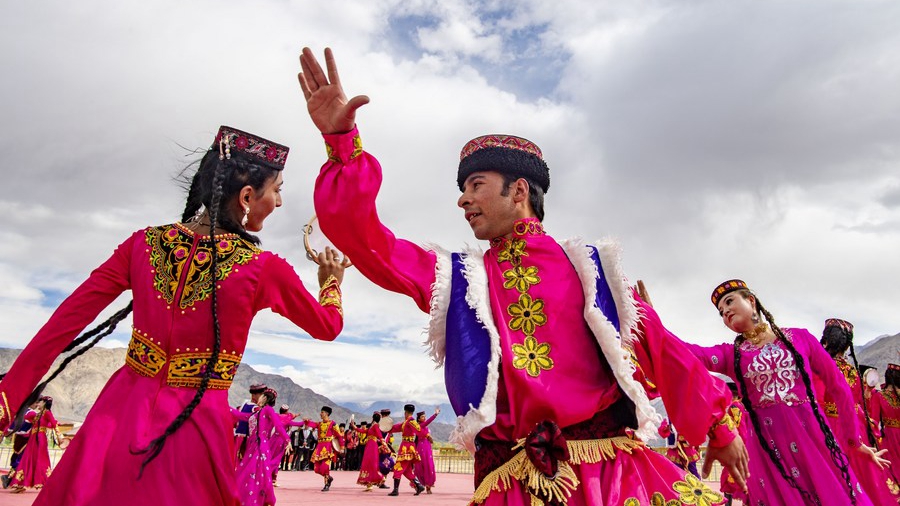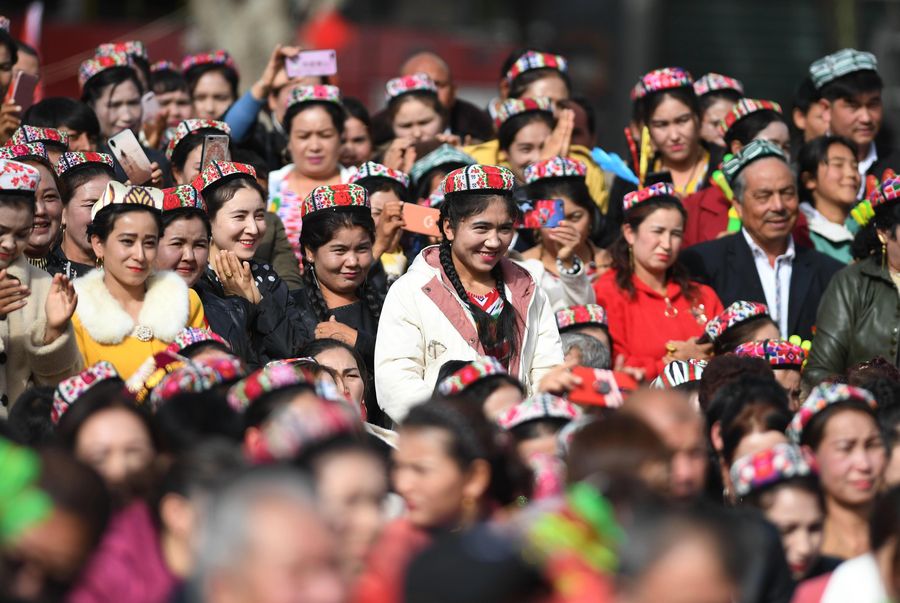
Performers dance during the Dragon Boat Festival at an intangible cultural heritage exhibition park in Taxkorgan Tajik Autonomous County, Xinjiang Uygur Autonomous Region, northwest China, June 25, 2020. /Xinhua
Performers dance during the Dragon Boat Festival at an intangible cultural heritage exhibition park in Taxkorgan Tajik Autonomous County, Xinjiang Uygur Autonomous Region, northwest China, June 25, 2020. /Xinhua
Editor's note: Xin Ping is a commentator on international affairs. The article reflects the author's opinions and not necessarily the views of CGTN.
Imagine yourself sitting in a theater. On stage are contracted performers acting by the playbook and orchestrated by the director. After the show, you leave and return to the reality – there is a clear line between what is imaginary and what is real.
What if you unknowingly live in a large set? There is no entrance and exit, no mark on actors and no scripts open to the public. Except for the audience, every role knows and plays its part. Such an "immersive" complex is constantly built in and by the United States. Today, the U.S. does not have a military-industrial complex, it has become a military-industrial complex.
With the joining of media and academic, the more suitable term Military-Industrial-Media-Academic Complex (MIMAC) was thus created. After close coordination during the Gulf War, the bombing of Yugoslavia and the Iraq War, the practice is again illustrated in the anti-China campaigns.
MIMAC centers around self-interests. Representing various industries, special interest groups in the U.S. want a disproportionate share of global benefits while trying all out to keep China down. To pressure other countries not to do business with China, the China-hawks in Washington hire propagandists to defame China with generous financial incentives, which have drawn a handful of so-called think tanks, scholars and media groups.
The self-claimed academic institutions and experts fabricate reports with dubious and biased sources. Then the media look the other way, skipping steps such as verifying information, assessing sources' independence or challenging conclusions with contradictory facts. After the "gatekeeping," what is presented to the public are reports that cannot stand scrutiny or the test of truth.
When the eyes are on the greenback, the head can believe in and the mouth can say anything. In MIMAC, the "fourth power" easily turns into the fourth "handmaiden." More bucks are on the way.
The U.S.-led propaganda against China is expected to rear its ugly head further with the introduction of the Strategic Competition Act in the Congress, which will allocate $300 million from 2022 through 2026, including for campaigns on mainstream and social media to the new "Countering Chinese Influence Fund." More journalists trained and bought to smear China will join the MIMAC cast.
Different themes move on and off the theater's calendar, but those about China are there to stay. One of the latest show is on Xinjiang, an autonomous region in northwest China resided by Uygurs and more than 40 other ethnic groups.

People attend a culture and tourism festival themed on Dolan and Qiuci culture in Awat County of Aksu Prefecture, Xinjiang Uygur Autonomous Region, northwest China, October 25, 2019. /Xinhua
People attend a culture and tourism festival themed on Dolan and Qiuci culture in Awat County of Aksu Prefecture, Xinjiang Uygur Autonomous Region, northwest China, October 25, 2019. /Xinhua
The land of peace and harmony received genocide "determination" from former and current U.S. senior officials, who have neither visited the place nor read on-the-ground reports. The unfounded accusation and the danger of abusing the genocide concept have been long warned by legal experts and UN human rights experts.
But the directors just stick to their plan as long as they shut out criticism from the theater. Behind the scene, what they want is exactly not revealing the truth but serving their own agenda. They rely on troupes different in name but the same in lineup. When it comes to issues related to China, even the masks and costumes give the real identity of the performers away.
Take, for example, the report on Xinjiang co-authored by Newlines Institute for Strategy and Policy in the U.S. and the Raoul Wallenberg Centre for Human Rights in Canada. Funded by a private American university, the U.S. institute set up a working group to study the conditions of Uygurs in Xinjiang.
Can you guess who is top on the list of founding members? Adrian Zenz, who makes a living from churning out rumors about Xinjiang and China as a whole. Many authors of the joint report are prejudiced against China as they work as consultants to Pentagon or U.S. State Department, advocating for hard-line China policies.
Take the Uygur Tribunal as another example. It is a private company registered in Britain. It is funded by the World Uygur Congress dedicated to destabilizing Xinjiang and separating it from China with direction and finance from the U.S. government.
It invites "experts" including the right-wing militaristic Australian Strategic Policy Institute, which stands out with shoddy reports and fake stories about China. Its "Chair" Geoffrey Nice was reportedly a British agent and staged an anti-China farce in 2019. Its witnesses are paid habitual liars about Xinjiang, who can't even make their stories straight on different occasions.
In the MIMAC theater, money talks; state-sponsored money talks louder. There is no more independence of press or academic research, still less the rule of law.
Stay vigilant. What happens in the play could have real-life implications. If illusions of truth permeate, will truth still exist? If human rights means nothing but a pretext, will human rights in a real sense be truly protected?
In the narrative forged by MIMAC and driven by interests, human rights and its violations are politicized. The charges against Xinjiang enrich the anti-China groups while stripping locals' right to employment and development. That politicization constitutes the gravest human rights violation.
(If you want to contribute and have specific expertise, please contact us at opinions@cgtn.com.)

